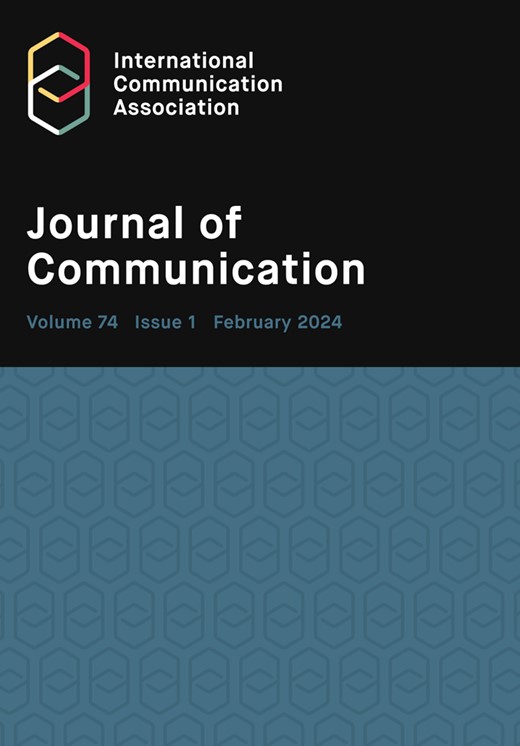The Impact of Fake News on Public Trust in Traditional Media Outlets
IF 6.1
1区 文学
Q1 COMMUNICATION
引用次数: 0
Abstract
Purpose: The study sought to investigate the impact of fake news on public trust in traditional media outlets. Methodology: The study adopted a desktop research methodology. Desk research refers to secondary data or that which can be collected without fieldwork. Desk research is basically involved in collecting data from existing resources hence it is often considered a low cost technique as compared to field research, as the main cost is involved in executive’s time, telephone charges and directories. Thus, the study relied on already published studies, reports and statistics. This secondary data was easily accessed through the online journals and library. Findings: The findings reveal that there exists a contextual and methodological gap relating to fake news on public trust in traditional media outlets. Preliminary empirical review revealed that the widespread dissemination of fake news through social media significantly eroded public trust in traditional media outlets. It found that demographic factors such as age, education, and political affiliation influenced susceptibility to fake news, with younger and less media-literate individuals being more affected. The impact varied geographically, with higher trust erosion in politically polarized and less regulated regions. The study highlighted the need for enhanced media literacy, stricter content moderation, and greater transparency in traditional media to restore public trust. It emphasized a multifaceted approach to mitigate the negative effects of fake news globally. Unique Contribution to Theory, Practice and Policy: The Agenda-Setting Theory, Uses and Gratification Theory and Cultivation Theory may be used to anchor future studies on the impact of fake news on public trust in traditional media outlets. The study recommended comprehensive strategies to address the impact of fake news on public trust in traditional media. Theoretically, it called for further research into the psychological and sociological mechanisms behind susceptibility to fake news. Practically, it emphasized the importance of media literacy programs and transparent reporting practices. For policymakers, it advocated for robust regulatory frameworks and international cooperation to combat misinformation. The study also suggested that traditional media invest in technological solutions like AI for detecting fake news and engage the public more proactively to rebuild trust.假新闻对公众对传统媒体信任度的影响
目的:本研究旨在调查假新闻对公众对传统媒体信任度的影响。研究方法:本研究采用案头研究方法。案头研究指的是二手数据或无需实地调查即可收集到的数据。案头研究基本上是从现有资源中收集数据,因此与实地研究相比,案头研究通常被认为是一种低成本技术,因为主要成本涉及执行人员的时间、电话费和目录。因此,本研究依赖于已出版的研究、报告和统计数据。这些二手数据可通过在线期刊和图书馆轻松获取。研究结果:研究结果表明,假新闻在公众对传统媒体的信任度方面存在背景和方法上的差距。初步实证审查显示,通过社交媒体广泛传播的假新闻极大地削弱了公众对传统媒体的信任。研究发现,年龄、教育程度和政治派别等人口统计因素影响了对假新闻的易感性,年轻和媒体知识较少的人受到的影响更大。这种影响因地域而异,在政治两极分化和监管较少的地区,信任度受到的侵蚀更大。研究强调,传统媒体需要加强媒体素养、更严格的内容节制和更大的透明度,以恢复公众信任。研究强调应采取多方面的方法来减轻假新闻在全球范围内的负面影响。对理论、实践和政策的独特贡献:议程设置理论、使用和满足理论以及培养理论可用于今后关于假新闻对公众对传统媒体信任的影响的研究。研究建议采取综合策略来应对假新闻对公众对传统媒体信任的影响。从理论上讲,它呼吁进一步研究假新闻易感性背后的心理和社会学机制。在实践中,它强调了媒体扫盲计划和透明报道做法的重要性。对于政策制定者来说,它主张建立健全的监管框架并开展国际合作,以打击虚假信息。研究还建议传统媒体投资人工智能等技术解决方案来检测假新闻,并更积极主动地与公众互动,以重建信任。
本文章由计算机程序翻译,如有差异,请以英文原文为准。
求助全文
约1分钟内获得全文
求助全文
来源期刊

Journal of Communication
COMMUNICATION-
CiteScore
11.60
自引率
5.10%
发文量
41
期刊介绍:
The Journal of Communication, the flagship journal of the International Communication Association, is a vital publication for communication specialists and policymakers alike. Focusing on communication research, practice, policy, and theory, it delivers the latest and most significant findings in communication studies. The journal also includes an extensive book review section and symposia of selected studies on current issues. JoC publishes top-quality scholarship on all aspects of communication, with a particular interest in research that transcends disciplinary and sub-field boundaries.
 求助内容:
求助内容: 应助结果提醒方式:
应助结果提醒方式:


